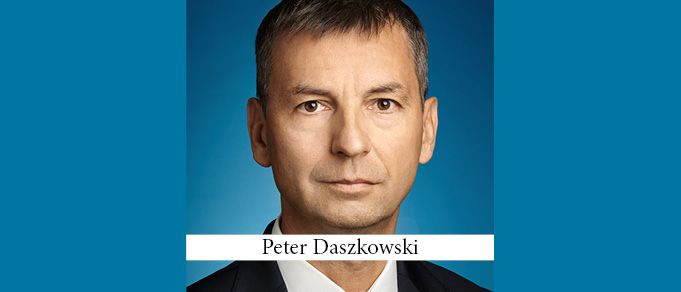Despite fighting his way through a spring cold, Peter Daszkowski, Co-Managing Partner of Wolf Theiss in Poland, is sanguine about the state of affairs in Poland. "With regard to Warsaw it’s business as usual,” he says.
In terms of the legal market itself, Daszkowski says, "lawyers are doing well.” He explains that “the market is competitive — but a competitive market is very good for us all.” And that market is fairly stable, he reports. “The players are the same that we’ve had for the last couple of years, and we see the regular moves,” he says, though he does pause to note Noerr’s merger in January 2017 with a team of eleven lawyers (including four of the five partners) from DJBW, including former White & Case Poland head Witold Danilowicz. “It will be interesting to see how they do,” he says.
The major subjects of conversation he has with peers, he reports, are the likely significance of Brexit to Poland and the Polish government’s efforts to reorganize the Polish courts. With regards to Brexit, Daszkowski concedes, it’s still too early to know how things are going to fall out, and which continental capitals are going to benefit — if any — from the potential flight of financial service providers from their traditional capital. With as many as 750,000 to 1 million Poles living in London, Polish lawyers continue to believe their nation’s capital is well-positioned to benefit from the fallout of Brexit, Daszkowski reports, but he concedes that analysts say similar things about Brussels, Madrid, and Berlin, among others.
Daszkowski also reports that lawyers are unsurprisingly carefully attuned to news about the ongoing efforts by the ever-controversial Polish government — Daszkowski refers to comments made on May 1, 2017 by French presidential candidate Emmanuel Macron named the head of Poland’s governing Law and Justice Party, Jaroslaw Kaczynski, as among the “regimes” allied with Macron's far-right opponent Marine Le Pen, which followed previous comments indicating that, if elected, he would urge the European Union to impose sanctions on Poland for violating democratic norms — to search for ways to increase its influence in Polish courts.
Another persistent story is the country’s ongoing efforts to deal with re-privatization, with some more than 2500 proceedings still open, now almost thirty years after the Berlin Wall fell. New legislation has finally been created in an attempt to bring that process to an end, Daszkowski reports, "because keeping it ongoing forever is problematic.” The new legislation Daszkowski refers to involves the publication of addresses up for re-privatization, following which former owners are given six months to notify authorities of their existence and state their claims. If no such claims are made within the six month window, the City of Warsaw has the right to close down the proceedings permanently. Publication of the lists just started a few weeks ago with 48 addresses, and another 15 published more recently. According to Daszkowski, “this is something we always discuss.”
Similarly, Daszkowski refers to new White Collar Crime legislation recently signed into law by the Polish president, which enables the state to confiscate the ownership rights of enterprises used for "serious criminal activities.” Daszkowski says this too has potential, but “we will have to see how it will work.”
Ultimately, Daszkowski says, the "Government doesn’t seem to be very friendly to the European Union, but to investors from abroad [things] haven't changed that much, and everything is going well in my opinion. I don’t see much impact not the situation, and business is going very well. Most of the clients already in Poland are satisfied, and more are thinking about coming."

















